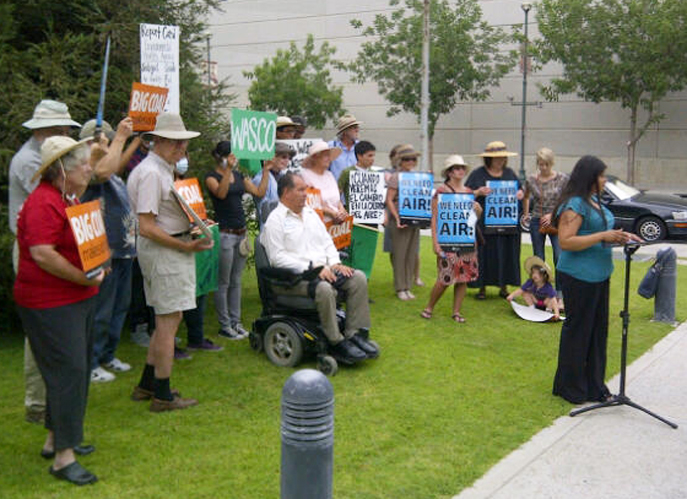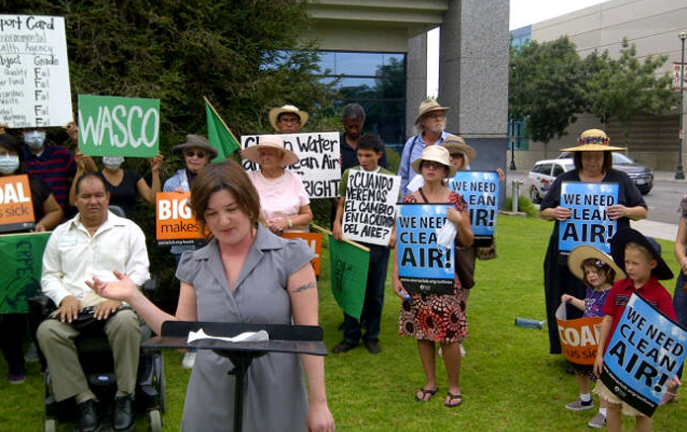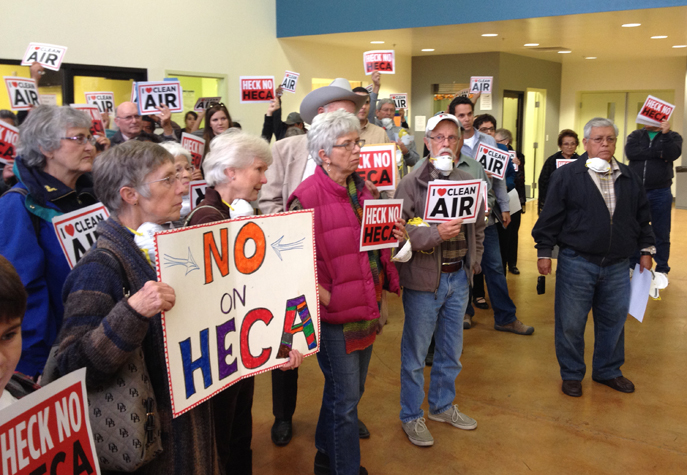Hydrogen Energy California (HECA) Coal Plant Developer Throws in the Towel
We did it! For years, alongside local community groups and activists, Sierra Club has been fighting the ill-conceived $4 billion dollar proposal to ship coal into California to produce fertilizer and power. On March 3, just days before the California Energy Commission was scheduled to hear arguments about whether the project should be reinstated from a six-month suspension or terminated, the developer officially withdrew its application. Coincidentally, this news came exactly one year to the day from when Sierra Club, HECA neighbors, and the Association of Irritated Residents set the wheels in motion to kill the project.
Above, that's Nikolas Leon making a homemade "No on HECA" sign. Below, Nikolas displays his handiwork.

Every aspect of the HECA proposal was more ridiculous than the next. HECA planned to ship coal by open-top railcar over 650 miles into the leading clean energy state, draw 7,500 acre-feet annually of usable agricultural water away from an over-tapped aquifer during an historic drought, and burn coal in the most polluted air basin in the country, affecting environmental justice communities already suffering the lowest health outcomes in the state. Incredibly, HECA would not have even provided any benefit to California’s energy consumers. The project would have produced only 53 MW of added power to the grid during its maximum electricity production, and it would have pulled 62 MW from the grid during maximum fertilizer production.
The local farming community and environmental justice communities, including HECA Neighbors, the Center for Race, Poverty & the Environment, Central California Justice Network, and GreenAction, rallied against the proposal at every turn and turned out in the hundreds to voice their concerns at the air district and the California Energy Commission, even coming to the hearings straight from the fields during the busy fall harvest.

Above, Byanka Santoyo from Citizins for a Better Arvin speaks at a 2012 rally in Bakersfield. Below, Andrea Issod, an attorney with the Sierra Club's Environmental Law Program addresses the crowd at the same rally.

This hecka bad idea has persisted for the last eight years largely because of funding from the Department of Energy, which doled out at least $150 million dollars of taxpayer money for HECA’s public relations consultants, lobbyists and lawyers, and scandalous backroom dealings with the state Public Utilities Commission. As reported by the San Francisco Chronicle after conducting a review of 65,000 emails, PG&E Vice President Brian Cherry told a former PUC President Micheal Peevy that “‘you owe’ another PG&E executive for keeping alive the struggling $4 billion project near Bakersfield. A month later, Cherry called on Peevey’s top aide to repay the debt by intervening to appoint an administrative law judge he wanted to oversee a $1.3 billion rate case [regarding the San Bruno pipeline explosion.]”
Below, a 2013 "No on HECA" citizen rally in Buttonwillow, California. Note the handmade sign at left, being held by Nikolas Leon's grandmother Marion Vargas of Bakersfield.

HECA cited the U.S. Supreme Court’s stay of the Clean Power Plan as one of the reasons for withdrawing the Project. That’s nonsense. In fact, California’s own efforts to cut greenhouse gas emissions are more stringent than the Clean Power Plan, and the state is set to meet the federal emission target ten years early just by executing its existing program.
HECA’s demise is further evidence that the last-ditch efforts to save the industry with the myth of “Clean Coal” have failed. The Kemper plant in Mississippi, one of only new coal plants that has actually been built in the last decade, with $270 million of help from the Department of Energy, is now estimated to cost at least $6.6 billion, $4 billion more than originally proposed, and the plant has not even been able to successfully burn coal yet. The FutureGen project in Illinois is officially dead, after over a decade of work and $200 million of taxpayer money since President Bush originally proposed it in 2003.
After seven years of fighting HECA, the prevailing sentiment is aptly summarized by Chris Romanini, one of the leading activists from HECA Neighbors:
“This is a tremendous victory for HECA neighbors and the people of Kern County who have opposed this disastrous project from day one. For eight years, we’ve lived in the shadow of this terrible proposal that would have taken our precious water and sickened our families with dirty air. As a fourth generation farmer, I’m just relieved to finally have this project behind us and can once again see a future for my grandkids farming on our land.”
